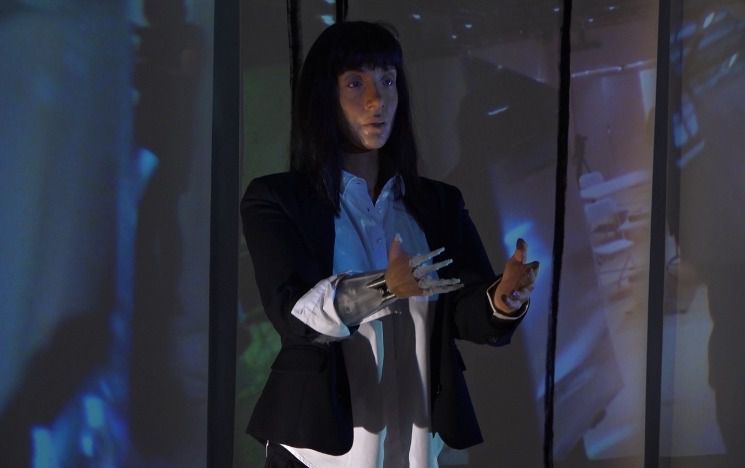Robot Opera

Long the domain of popular science fiction, robots increasingly permeate every aspect of society. How will this impact the creative and performing arts? This research strand, initiated by the Centre for Research in Opera and Music Theatre (CROMT) and supported by Knowledge Exchange in Media, Arts and Humanities, the Sussex Humanities Lab and the Centre for Research in the Creative and Performing Arts, explores the ramifications of robot presence through encounters between robots and humans through music, words, movement, image and operatic performance.
We launched this project in June 2017 with a mini-symposium featuring researchers from Sussex, and continued in 2019 with a practice based project Robot Opera – What's Next? For the next stage, in June 2021, we worked with a Cleo Mesmer robot manufactured by Engineered Arts, exploring human-robot interaction, hybridity and otherness. The 2021 events comprised two performances:
- Robo_Po, a robot poetry reading in which Cleo spoke poems written by humans;
- Robo_Op, an operatic performance with the Cleo robot and a cast of human performers.
Each performance was live streamed on Zoom and was followed by a panel discussion and Q & A with audience members. See our Archive for further details on our robot opera events.
Watch a short documentary about the recent robot opera event:
Primary Research Questions:
Robots and Performance - what happens if we put a Robot on a stage? How does an audience 'read' its presence? Is puppeteering the most relevant model, given the current state of embodied AI? Clearly the robot does not ‘know’ it is performing, or could you say that on some level a robot is always performing?
Embodiment - computer music has a long history involving artificial intelligence and creativity, and we already have computers that can improvise / compose / play music. If a robot is essentially a computer that can move around, how does embodiment affect or change the acquisition / expression of these skills?
Vocality - how would a robot sing if it sang like a robot rather than being programmed to sing like a human? i.e. what about its physicality would provoke / create sound? What does it ‘mean’ for a robot to sing?
Read a news story about this project, featuring a clip from ‘Opposite of Familiarity’, a 5 minute opera for two Nao Robots, cello and piano by Professor Ed Hughes.
See a clip from the 2019 performance. This features a short scene from Here Kittykitty, for a Pepper robot, a human singer, a human cellist, a robot cello and a robot cat.
Below, you can see interviews of participants in the most recent robot opera events from June 2021:
Here are two interviews regarding the robot poetry event (Robo_Po):